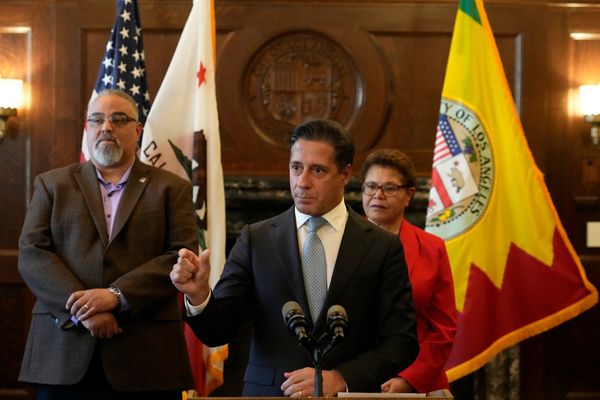For what seems like forever, Americans have been asking why it's so damn hard — and expensive — to file their taxes.
One reason is that the U.S. tax code is complicated, the result of government's using it not merely to raise money but to implement social goals.
But the greater reason is that the tax software industry has made free filing difficult, if not impossible, for tens of millions of taxpayers. That whole sorry history has now been laid out in detail by the Federal Trade Commission.
In a lawsuit filed Monday in federal court in San Jose, the FTC alleges that Intuit, the maker of the industry-leading tax software program TurboTax, has systematically misled consumers into believing that they could prepare and file their federal taxes for free.
Only after they've invested time and effort to start the process does the program inform them that they're not eligible for the free service and will have to pay up to continue.
"TurboTax is bombarding consumers with ads for 'free' tax filing services, and then hitting them with charges when it's time to file," Samuel Levine, director of the FTC's Bureau of Consumer Protection, said in announcing the lawsuit.
Levine called Intuit's behavior a "bait and switch." The agency asked the court to issue a temporary restraining order prohibiting Intuit from continuing its allegedly deceptive ad campaign.
Intuit called the FTC's allegations "simply not credible," according to a statement from Kerry McLean, its general counsel. "Far from steering taxpayers away from free tax preparation offerings, our free advertising campaigns have led to more Americans filing their taxes for free than ever before."
The action by the FTC, newly assertive under its new chair, Lina Khan, is well-timed, coming as it does just as millions of Americans settle down to file 2021 taxes due April 18.
It's also the latest volley in a long battle involving tax preparation software companies, the IRS and consumer advocates over the companies' obvious determination to keep consumers paying for tax service.
The companies long have lobbied against allowing the IRS to provide free, pre-filled tax returns for taxpayers with the simplest tax situations — wages and bank interest already reported to the IRS, for instance.
Tax experts have observed that the commercial software companies share the goal of keeping tax preparation complicated with the anti-tax lobby, which sees the onerous tax-filing process as a way to "fuel anti-tax sentiment," in the words of Vanderbilt University tax expert Beverly Moran.
The companies' lobbying, for instance, hobbled an IRS program to provide free tax preparation software and filing to consumers. As J. Russell George, then the Inspector General for Tax Administration, traced the program's evolution for the House Ways and Means Committee in 2006, it was launched in 2003 to "provide free tax preparation and electronic filing services to all taxpayers."
After 2005, however, the program was changed to focus only on low-income taxpayers. (It's currently available only to taxpayers with adjusted gross income less than $73,000.) George explained that the goals of the Free File Alliance, or FFA, the consortium of tax software firms participating in the program, included keeping the government out of the tax preparation business.
Intuit alludes to that threat in its corporate financial filings.
"If ... the IRS were to enter the software development and return preparation space, the federal government could become a publicly funded direct competitor of the U.S. tax services industry and of Intuit," the company said in its most recent financial disclosure, for its quarter ended Jan. 31. "Government funded services that curtail or eliminate the role of taxpayers in preparing their own taxes could potentially have material and adverse revenue implications."
The tax software industry hasn't been shy about spending lavishly on lobbying to protect its franchise — nearly $3.3 million from Intuit in 2021 alone, according to Opensecrets.org.
In return for gaining the firms' cooperation, the IRS agreed not to create a government-run filing service, ProPublica observed as part of its comprehensive reporting on federal tax issues.
The companies also relished the "opportunity to market their other products" to taxpayers, George testified. The firms didn't get everything they wanted; they weren't permitted to advertise their paid services directly to users of the Free File Program.
State and local officials have joined the battle over free filing on the consumers' side. In 2019, Los Angeles City Attorney Mike Feuer sued Intuit and H&R Block, the maker of the second most popular tax software, alleging that they connived for years to discourage millions of taxpayers from taking advantage of Free File. The lawsuit is pending, with both sides currently engaged in discovery to prepare for trial.
In an email, Intuit boasted to me of having been "a founding member of the IRS Free File program." The company didn't mention in that email, however, that it quit the program in 2021, one year after H&R Block did the same. The program, which started with 12 participating companies, is now down to eight relatively small firms.
Intuit said in announcing its withdrawal that it did so "to focus on further innovating in ways not allowable under the current Free File guidelines."
Company spokesperson Karen Nolan told me by email that by then the Free File program had "far surpassed its stated goals for e-file and free tax filing." That would come as a surprise to the office of the Inspector General for Tax Administration, which found after a 2020 audit that only 2.5 million of the 104 million taxpayers eligible for free filing through the program actually used it in the prior tax year.
More than 34.5 million of those eligible taxpayers, however, ended up using the Free File alliance members' paid software. The auditors' conclusion was that the program was not "operating as intended" — that "eligible taxpayers attempting to prepare and e-file their returns at no cost are diverted to tax return preparation services that are not free."
The auditors blamed the IRS for not monitoring the program participants and failing to make sure that taxpayers even knew about the program and how to access it.
In its lawsuit, the FTC identifies several tactics that it says Intuit used to discourage consumers from using the free IRS program.
One tactic was to block internet search engines from finding Intuit's Free File web page.
"It sounds like we have the ability to block our FFA offering/landing page from organic search if we rename to TurboTax Free Edition," an unidentified Intuit employee states in a September 2018 email quoted by the FTC. "This sounds like a great solution if we learn that TurboTax Free File does start to outrank our commercial Free."
Intuit did so from Nov. 13, 2018, to April 26, 2019, the FTC says. Intuit denies that. Rather than block search access to the page, Rick Heineman, the company's vice president of corporate communication, told me that Intuit "optimized it for search."
Yet the inspector general's auditors confirmed that search-blocking was common among the Free File partners. The audit found that at least five of the 12 firms participating in Free File had used web coding on their Free File web pages that "prevented Internet search engines from displaying them in search results." The audit didn't name Intuit as one of those firms, but its finding parallels the FTC accusation.
The gist of the FTC's lawsuit concerns Intuit's advertising campaigns for TurboTax. Much of that advertising, the agency asserts, "conveys the message that consumers can file their taxes for free using TurboTax, even going so far as to air commercials in which almost every word spoken is the word 'free.'"
In fact, the FTC says, TurboTax is free only for users with the simplest tax filings. "For many others, Intuit tells them, after they have invested time and effort gathering and inputting into TurboTax their sensitive personal and financial information, ... that they cannot continue for free; they will need to upgrade to a paid TurboTax service to complete and file their taxes."
The FTC says the company's commercials allude to the possibility that some users may be ineligible in small print flashed briefly on screen and not read aloud by the commercials' narrators.
Over the years, the FTC says, Intuit has tweaked the definition of "simple" tax returns that make users eligible for free filing. In the past, the firm accommodated users filing simple Form 1040s with only limited attached schedules, such as those listing student loan interest deductions or unemployment income.
In tax years 2018 and 2019, however, those claiming student loan interest deductions were no longer eligible for what the firm called its "freemium" program, the FTC says. Customers receiving income as independent contractors, such as gig workers, are not eligible; that may not be clear to users until they reach the point in the process where they disclose the nature of their earnings or deductions, at which point they're required to pay for a program upgrade.
Those upgrades can be costly. The base TurboTax paid program, dubbed "Deluxe," lists for $59; those with stocks, bonds or other investments to report may need the "Premier" version, for $89; and gig workers and other self-employed taxpayers may need to pay $119.
What often gets passed over in the debate over the costs and effort of tax filing in the U.S. is that for most people, most of it should be unnecessary. As long ago as 2006, economist Austan Goolsbee, later an advisor to the Obama administration, proposed the Simple Return, which he said might serve as many as 40% of taxpayers.
Goolsbee observed that two-thirds of taxpayers took only the standard deduction rather than itemize. Many of them received all their income in wages from one employer and interest income from one bank. For them, the IRS already receives information about their income from those employers and banks.
"The IRS then asks these same people to spend time gathering documents and filling out tax forms, or to spend money paying tax preparers to do it," Goolsbee wrote. "In essence, these taxpayers are just copying into a tax return information that the IRS already receives independently." There is no reason why the IRS couldn't transfer the same data to a pre-filled form and send it to the taxpayer for their signature.
Anyone preferring to fill out their own taxes could do so. "For the millions of taxpayers who could use the Simple Return, however, filing a tax return would entail nothing more than checking the numbers, signing the return, and then either sending a check or getting a refund," Goolsbee wrote.
He's right, of course. Some 36 countries permit return-free tax filing for at least some taxpayers. The U.S. could join them — if Congress could only wrest itself from its obeisance to companies like Intuit.







